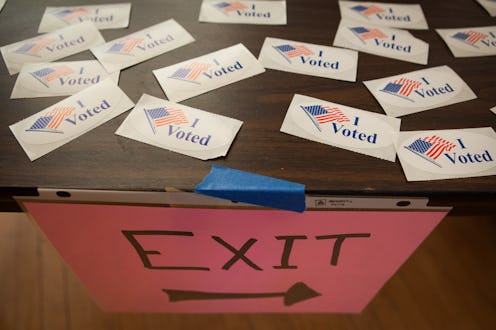News
The Electoral College Is Really Undemocratic
Voting matters, and your vote counts. But the electoral process in the United States is deeply flawed thanks in part to the Electoral College, an institution established by the framers of the Constitution because they feared the potential outcome of relying solely on the will of the people. That's not actually how it's used today, but there are several aspects of the Electoral College that make it undemocratic nonetheless.
The most glaring assault on the democratic process imposed by the Electoral College is the fact that it enables a candidate to win the presidency while losing the popular vote. This has actually happened, and not long ago. In 2000, George W. Bush lost the popular vote, but became our president, anyway. Before that, it hadn't happened since the 1800s, though that was a century that saw it occur three times, with John Quincy Adams in 1824, Rutherford B. Hayes in 1876, and Benjamin Harrison in 1888.
These scenarios — win the popular vote but lose the Electoral College vote — occurred partly because of the way electoral votes are allocated. The vast majority of states, 48, use a winner-take-all system, so if a candidate gets a plurality of votes within a state, he or she gets all its electoral votes. In 2000, Al Gore actually won about 540,000 more votes than Bush nationally; however, because of where he won them, he only got 266 electoral votes compared to Bush's 271.
Nebraska and Maine use a more proportional method at first glance by allocating electoral votes based on congressional district results. However, that actually doesn't solve the problem. As the Congressional Research Service (CRS) reported, if all states had implemented such a system in 2000, Bush would have won by a much bigger margin.
Even proportional allocation of electoral votes on the state level wouldn't correct this issue. The CRS reported that, with such a system, Gore would have had fewer electoral votes than Bush, though by a smaller margin. Neither candidate would have won the required 270 needed to earn the presidency.
Any time you have a smaller number of votes representing a larger number, the numbers aren't going to round out perfectly. For example, in the 2012 election, each of Wyoming's electoral votes represented approximately 70,000 general electorate votes, whereas in California, each electoral vote represented 179,000 popular votes. Some people's votes count more than others.
The winner-take-all method in particular is problematic in other ways. Aside from potentially disincentivizing people in reliably red or blue states from showing support for the less dominant party at the polls (because they will win nothing), it also puts very uneven weight on how much states matter in elections — and, thus, which states politicians give a damn about. In a purely presidential politics sense, New Hampshire matters more than New York because its vote could go either way, and since all its votes go to one candidate, each has a higher stake in New Hampshire voters' decisions than in those of New Yorkers. National Popular Vote reported that two-thirds of campaign events during the 2012 presidential election took place in four states.
A final absurdity about the Electoral College is that the Constitution doesn't require electors to even vote based on the popular vote, and only half the states and D.C. have adopted legislation requiring them to do so. That leads to a question, every election cycle, as to whether some will be "faithless electors" and go rogue during the official vote. It's unlikely that they would be bold enough to do so in large numbers today. But the fact that there's even such a possibility is counter to the meaning of democracy.
The structural problems with the voting system itself point to the need for political engagement beyond the voting booth. If states with a combined total of 270 electoral votes agree to give them all to whichever candidate wins the national popular vote, then the Electoral College would be null and void and each person's vote would count equally, regardless of where they live. That's something citizens can put pressure on their elected officials to accomplish — National Popular Vote has a handy web tool for contacting your legislator. Eleven states, with a total of 165 electoral votes, have gotten on board with the initiative.
I believe the Electoral College is an undemocratic institution that, though tempered from the days of Alexander Hamilton, continues to make certain votes and states more powerful than others.
